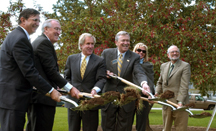|
Sept. 29, 2003
Purdue to break ground on bioscience center
WEST LAFAYETTE, Ind. – Purdue University celebrated the start of construction today (Monday, 9/29) on the Bindley Bioscience Center, an interdisciplinary facility that will enable scientists and engineers to collaborate on research contributing to the Indiana economy.
The center is named for Purdue graduate William E. Bindley, who last year donated $52.5 million to his alma mater. Bindley designated $7.5 million of his gift to cover half the cost of the building, which will be located in Purdue's Discovery Park. The other half will come from earnings from unrestricted endowments. A ceremonial groundbreaking was held today at 2:30 p.m. on the lawn north of Herrick Laboratories, at the corner of State and Intramural streets.
University President Martin C. Jischke said the new center would be a key contributor both to Purdue and to the state's economy.
Bindley Bioscience Center groundbreaking
Download photo - caption below

|
"The Bindley Bioscience Center will make possible research leading directly to innovations in medicine and science," Jischke said. "The facilities made possible by Mr. Bindley's generous gift will enrich education as well as the state of Indiana by encouraging economic development and helping Purdue attract and retain the best faculty and students."
Bindley, who was present at the ceremony, is founder of Bindley Western Industries, a Fortune 200 company that was recently merged into Cardinal Health. He said he hopes the center will help the local and national economy.
"Purdue is providing the kind of education and science the state will need to be competitive," said Bindley, who is now chairman of the Indianapolis-based private equity investment firm Bindley Capital Partners LLC. "Based on the interdisciplinary nature of its research – primarily technical, but also pharmaceuticals and biopharmaceuticals – I consider this gift a very sound investment in the future of this state and this nation."
Business leaders involved in the biosciences agreed that the center would have a positive impact on the regional economy and also would lead to medical advances that would benefit humanity.
"The Bindley Bioscience Center, together with the other programs at Discovery Park, leverages Purdue's strong life science and engineering foundation into the commercialization of products and services," said David Goodrich, president of the Central Indiana Corporate Partnership and co-founder of the Central Indiana Life Sciences Initiative (CILSI). "Ultimately, this activity will not only have a tremendous impact on the state's economy, but will improve the way that people all over the world are diagnosed and treated for disease."
According to the Indiana Health Industry Forum, a statewide organization devoted to enhancing the economic growth and development of the health industry in Indiana and a CILSI co-founder, the life sciences in Indiana are the basis of a $38 billion industry that employs 320,000 people in more than 12,000 businesses.
Charles "Chip" Rutledge, executive director of Purdue's Discovery Park, said the center's potential for both education and research lay in its unusual organization, offering opportunities for multidisciplinary research not to be found elsewhere.
"Other universities are creating facilities that address new aspects of life sciences, but what makes ours unique is that our students can work together with scientists, engineers and specialists in informatics," he said. "Many disciplines will work together. Our students will have opportunities to study not only with their major professor, but also with faculty in related fields."
The center will house flexible laboratories for a wide range of multidisciplinary research and will connect researchers in the life sciences with engineers in the Birck Nanotechnology Center, also being built at the $100 million Discovery Park.
The 50,000-square-foot Bindley Bioscience Center will house 18,000 square feet of lab space configured into six large, open areas including:
• Two high-hood intensity labs;
• One medium-hood intensity lab;
• One low-hood intensity lab; and
• Two instrument labs (for imaging and mass spectrometry).
"No one group will be assigned permanent lab space," Rutledge said. "It is expected that research programs will flow in and out of the center. For that reason, each lab is modularly designed to accommodate differing project sizes."
Support services for the labs include a flexible utility room, cylinder storage closets, balance rooms, tissue/culture/radioisotope lab, constant temperature laboratory and cold rooms.
The building plans include multiple interaction and conference spaces, as well as office space for project leaders and research assistants. Corridors opening into the two-story atrium will provide multiple opportunities for interaction among the researchers.
Scientists and engineers from several Purdue schools involved in the new center will pursue work related to areas that include:
• Creation of the first computer model of an entire living cell – a bacterium called Escherichia coli, or E. coli. Findings from the international effort, called the E. coli Model Cell Consortium, will have numerous applications in a wide range of medical and scientific research, including proteomics and virology. Research based at the center will be critical for the consortium's work.
• Development of miniature devices and systems that can be used in the pharmaceutical industry to discover new drugs.
• Creation of sensor implants that might be used to diagnose medical conditions and monitor bodily processes such as irregularities in blood chemistry and heartbeat.
• Make new types of laboratory instrumentation for scientific research and education.
• Harness genes and proteins from plant and animal sources to create new medicines and materials.
• Engineer special grafts and synthetic "scaffolds" that will be used to repair and replace human tissue damaged by disease or accidents.
In September 2001, Bindley organized Bindley Capital Partners LLC, a private equity and investment firm headquartered in Indianapolis. The firm manages private capital and participates in specific financial market opportunities on both a direct and co-invest basis.
Bindley also is chairman of Priority Healthcare Corporation, which he founded in 1994. The company is a national provider of biopharmaceuticals and complex therapies for the treatment of chronic diseases. For the year 2000, it ranked 39th among all U.S. public companies in total return to shareholders and was ranked No. 30 in Business Week's "Hot Growth Companies of 2003."
In 1968, he founded Bindley Western Industries, a pharmaceutical distributor that became a Fortune 200 company that traded on the New York Stock Exchange. In February of 2001, Bindley Western was merged into Cardinal Health to create the largest health care distributor in the world. Following the merger, Bindley retired as chairman and chief executive officer of Bindley Western and served as a member of the board of directors of Cardinal Health until February.
Bindley was born in Terre Haute, Ind., and received his bachelor of science degree from Purdue in 1962. He received an honorary doctorate in management from Purdue in 1997. He is a former member of the Capital Improvement Board of Managers for the city of Indianapolis, a director of the Indianapolis Convention and Visitors Association and a past director of the Indiana State Chamber of Commerce.
Bindley, who also serves on the board of directors for the Purdue Research Foundation, is a member of the President's Advisory Council and the Dean's Advisory Board of the Krannert Graduate School of Management, which recognized him with the Distinguished Alumnus Award in 1996 and Krannert Business Leadership Award in 2002.
He is a trustee and past president of the U.S. Ski Team Foundation and is currently vice chairman and a member of the executive committee of the U.S. Ski and Snowboard Association, the national governing body for the U.S. Ski Team. He is a former owner of the Indiana Pacers professional basketball team and also served on the board of governors of the American Basketball Association.
In 1989 he received the Sagamore of the Wabash Award from Indiana Gov. Robert Orr for entrepreneurial leadership. In 1992 he received the Master Entrepreneur Award for the State of Indiana. He is listed in "Who's Who in the World" and "Who's Who in America."
He resides in Naples, Fla., with his wife Mary Ann.
Writer: Chad Boutin, (765) 494-2081, cboutin@purdue.edu
Sources: Martin C. Jischke, (765) 494-9708
Charles "Chip" Rutledge, (765) 494-6209, chipr@purdue.edu
Purdue News Service: (765) 494-2096; purduenews@purdue.edu
PHOTO CAPTIONS:
Indiana entrepreneur William E. Bindley attended the groundbreaking today (9/29) of the Bindley Bioscience Center, one of the buildings that will form Purdue University's Discovery Park. Bindley's gift of $7.5 million will finance half the cost of the building, to be completed by June 2005. Bindley's wife, Mary Ann, also attended the ceremony.
Purdue University broke ground today on the Bindley Bioscience Center, a $15 million facility for research in the life sciences. The building, for which half the funding was donated by entrepreneur William Bindley, will form part of Purdue's Discovery Park, which will facilitate interdisciplinary work in the sciences and engineering. Pictured (from left) at the ceremony are: Charles Rutledge, executive director of Discovery Park; J. Timothy McGinley, chairman of Purdue's Board of Trustees; Bindley; Purdue President Martin Jischke; Mrs. Mary Ann Bindley; and Graham Cooks, Henry Bohn Hass Distinguished Professor of Analytical Chemistry.
An artist's rendering shows the Bindley Bioscience Center, now under construction at Purdue's Discovery Park. The center will facilitate interdisciplinary research in the life sciences, allowing faculty and students to collaborate on projects that could enhance Indiana's $36 billion life sciences industry.

|
 Purdue News
Purdue News
 Purdue News
Purdue News